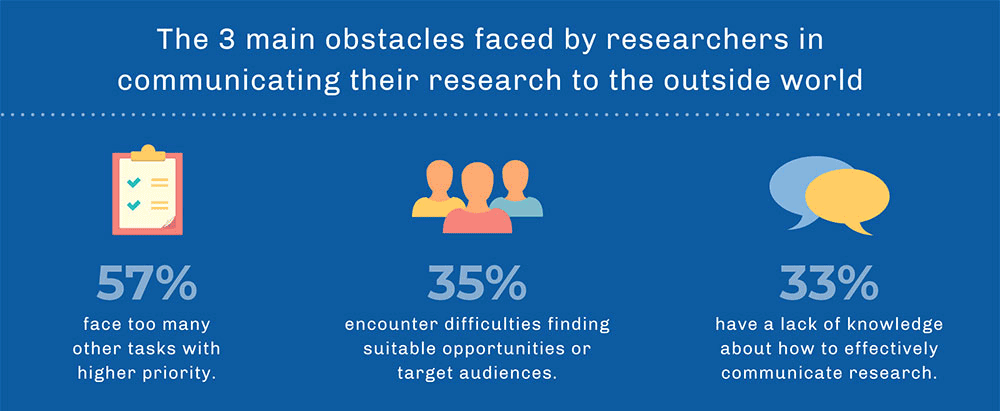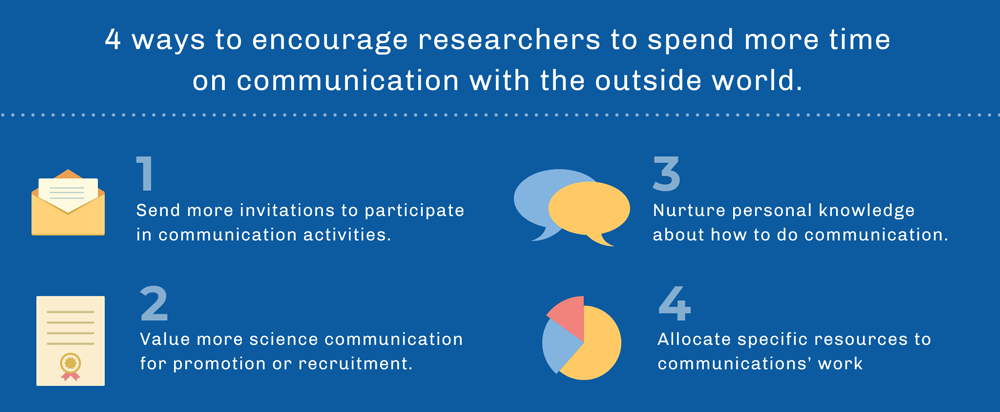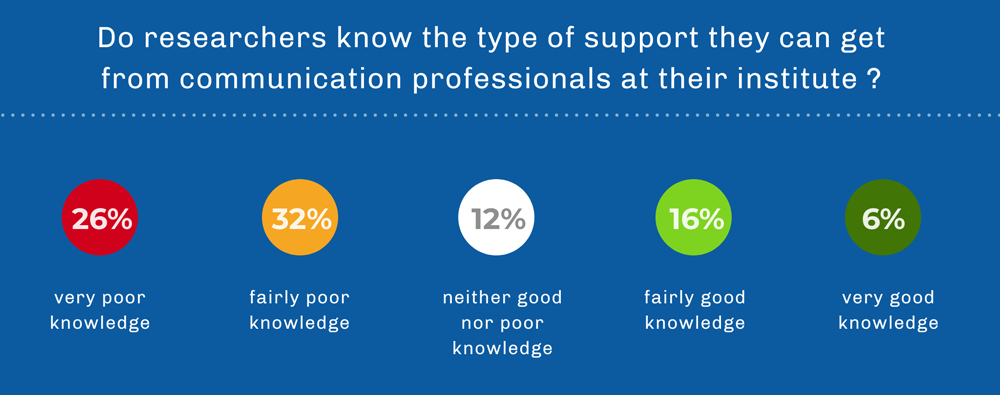Researchers in Swiss academia seem to want to communicate more with the general public but are hindered by both internal and external barriers according to a survey of 171 researchers in Swiss academia, mainly in life sciences. The survey complemented by the NCCR Chemical Biology in 2020 offers for the first time in Switzerland, valuable insights and useful qualitative aspects from the standpoint of researchers.
Science outreach from the researcher’s point of view
At the early stages of the coronavirus pandemic and the first Covid-19 lockdown, a reflection was engaged within the NCCR Chemical Biology management on how to circumvent the impossibility to conduct live outreach events. Envisioning digital solutions, a better understanding of the researchers’ views on communication, as well as the barriers and opportunities that they experience, appeared as the necessary first step in the reflection before deciding on alternatives. The institutional point of view on outreach is well known, stating the need for today’s researchers to communicate their research not just within but also outside the scientific community.
But what do researchers have to say about it? How do they experience outreach? What are the main barriers they encounter? What are their aspirations? Do mainstream media cover adequately science topics and if not, how do researchers react?
This myriad of questions was translated into an online survey inspired by a study conducted in Sweden by non-profit organization Vetenskap & Allmänhet (Public & Science) for Swedish scientists. In July and August 2020, we launched a survey investigating views of researchers on science communication. Two hundred and eighty-seven (287) entries from 12 different NCCRs and 11 Swiss universities were recorded. Hundred and seventy-one (171) researchers submitted a complete response. Only complete responses were taken into account in the statistics provided. The survey was complemented with 17 interviews (representing 20 hours of discussion) conducted mainly with senior researchers at different institutions (EPFL, UNIGE, UniBasel, ETH-Z) to dive deeper into the motivations and expectations of researchers in that respect. The qualitative results obtained adequately complete the conclusions derived from the small samples number (171) of participants to the survey. Both the survey results and the interviews align to draw meaningful conclusions.
Main results from the survey and the interviews
Overall, the survey shows that the participating researchers feel in great majority positive about communicating research with the outside world, recognizing mainly the need to generate support and trust in research among the public or raise awareness about research within society. During the interviews conducted after the investigation, one of the participants said:
Scientists are curious to meet people from different walks of life and not restrict themselves to preaching to the choir.
Despite this positive attitude, the average rate of participation in any kind of outreach activity per year is low, leaving room for improvement.
Researchers seem to want to engage in communication with the outside world, especially the general public, to a greatest extent then they currently do but they are hindered by both internal and external obstacles. Too many other tasks that have higher priority and not being sufficiently equipped to communicate their research are perceived as the main internal barriers. One of the persons interviewed for the survey explained:
Scientists do not want to put a lot of effort into planning, logistics, etc. but just come on the D-day with a clear sense of what they are supposed to do.
Externally perceived barriers include a lack of clarity about dedicated resources on communication or training as well as difficulties finding suitable opportunities and target audiences to communicate with.
The latter point is further enhanced by the language barrier often met:
What type of participation can you expect from people that don’t speak French, for example, when it comes to local events? I was included in something and then it turned out to be very frustrating because I could not do the communication part.
In most researchers’ experience, there is little recognition or acknowledgement of communication efforts by peers, during recruitment or promotion, which highlights the crucial role played by the lab or the institutional culture on outreach. According to one of the interviewees:
A lack of real support from the institution communication or even a not dynamic and modern approach in communication followed by institutional communication offices, creates a real gap between the scientists and the communication professional and jeopardizes in the end, efforts of scientists to communicate.
Finally, a need to be solicited more frequently for outreach events, better informed on opportunities or better trained in communication by professionals at the institutions seem to be the key messages administrations need to take care of in their outreach development policies.
Practical guides on how to communicate, how to present orally, are points that repeatedly come up in the discussions which complemented the survey. A better way to coordinate the dialogue with the general public seems necessary. Questions like what good communication is, what typical school children know, how the lay public perceive specific outreach events, how to build a rational argument or discuss a sensitive subject or remain close to the facts to avoid relaying fake news were repeatedly highlighted.
Furthermore, improving skills around reasoning abilities, writing or synthetic thinking, already from the bachelor level are aspects that need to be addressed by institutions and shared with interested scientists.
How can we encourage more science communication?
The results obtained through the survey aims to lead a more informed dialogue about what researchers think, need and already do in science communication to help us draft a plan of action responding to real demands and questions. They also provide useful feedback to our broad academic network to help them address better their outreach policy.
Within that frame, the initially proposed creation of a digital platform aiming at providing inspiration, ideas and practical advice to researchers while building a bridge between communication professionals and researchers doesn’t seem to be a right way to go to move forward to increase the participation and interest of researchers in performing outreach. There is rather the need to nurture proactivity of communication and outreach professionals in academia, to which most scientists declare to want to respond.
The opportunities were there, but I had to really look for them myself. When it came to me being useful in English, then I could grab my chance there and do those types of things. So, I had to look a bit deeper, but definitely the opportunities were there. Not always super obvious to be honest.
In other words, communication professionals should make the effort to identify various target audiences, to nurture the interest of the scientists to communicate as well as seek a feedback from the audience and inform the scientists about it. It seems indeed that the problem is not so much from the side of the researchers but is also worn by the institutions which need to set up a dynamic communication channel to encourage, train and value outreach among the researchers.
A concrete approach was proposed by the survey organizers to the participants: would a digital platform providing inspiration, ideas, and practical advice to better communicate with the outside world be a solution to encourage more communication of scientists with the general public? The feedback shows that a third of the participants are very interested and another half open to this perspective. Further insights into their motivation and a closer look at the real pains encountered indicate however that there are more critical points to address before deciding to launch a digital platform.
Profile of the survey’s participants
A majority of responses reflect the point of views from researchers affiliated to an NCCR (70%), mainly in natural sciences (78%), the rest coming from formal sciences (11%), applied sciences (8%) social sciences (2%) and humanities (1%). Almost half of the responders (48%) come from scientists affiliated to the University of Geneva.
More men (58%) then women (42%) took part in the survey, representing a majority of researchers (97%), while the remaining 3% include Administrator, IT technician, or communications professionals. The majority of the responses came from Junior researchers (76%) (with academic qualifications: bachelor/master (36%) or PhD (40%)) but still a significant tranche of senior researchers (24%) responded (assistant professor (5%) or associate/ full professor (19%)). For the particular case of the NCCR Chemical Biology, 20% of the solicited researchers participated in the survey, which is an acceptable open rate for surveys, reflecting perhaps an intrinsic bias whereby only interested persons gave a feedback.
➡ Download the results of the survey on science communication (PDF)
Synopsis of the results
Attitude
Nearly 9 out 10 of researchers (86%) are positive (fairly positive (33%) to very positive (53%)) about communicating research with the outside world. Interestingly, senior researchers are as positive (and even a bit more so), than their junior colleagues (95% to 84% respectively).
Reasons
The most important reason for communicating research to the outside world is to generate support and trust in research among the public (67%). The second next important reason is that research can raise awareness about research within society (50%). The need to give back to society follows closely as a lot of research is financed by public funds (42%) and so is the possibility to contribute to public debate (40%). To raise the profile of specific higher education institutions (2%) or facilitate mutual discussion about social and ethical questions around research (18%) are marginally shared views. To build support and trust in research among the public is a more important reason for researchers from natural sciences (71%) or formal sciences (61%) than those in applied sciences (50%) or social sciences (25%).
Publics
According to the researchers, the most important targets audiences to communicate with about science are the general public (74%), followed by the journalists (61%), schoolteachers (60%) and pupils (56%). Other selected target groups are spread among policy makers and politicians (54%) or specific professional groups (38%), business/ industry (36%) and other.
Value
Almost a third of the researchers (32%), believe that researchers who spend a lot of time communicating research to the outside world are positively valued by their colleagues, while a another third (32%) cannot express themselves either positively or negatively. More than a quarter (26%) feel that researchers who spend time on communication activities are negatively valued by colleagues. About 4 out of 10 senior researchers (44%) think that peers consider science communication neither negatively nor positively while junior researchers believe that other scientists, value more positively communication activities (35%).
Equipped
Almost 4 out of 10 researchers (37%) feel completely or fairly well equipped to communicate their research with the outside world. On the contrary 25% are not at all or poorly prepared, while 37% are partly equipped. Male researchers (39%) feel slightly more confident than female researchers (35%). Among postdocs, almost a third (27%) feel poorly or not at all equipped to communicate research with the outside world.
Barriers
The most common barrier in engaging in communication is having too many other tasks that have higher priority: 58% selected this as hindering reason. The difficulties in finding suitable opportunities (36%) and/or target audiences (36%) comes second, closely followed by the lack of knowledge about how to effectively communicate research (33%). Interestingly, the absence of recognition for promotion/recruitment shared by a third of them (32%) highlights that there is also an issue at the institutional level. Lack of recognition in funding applications is also pointed out by almost a fifth of the participants (19%).
Time
Half of the surveyed researchers (52%) would like to spend more time on science communication then they do today while 35% are content with the amount of time they currently spend on communication. Junior researchers (55%) are more motivated to do so than senior ones (39%). Almost as many women (47%) as men (53%) share the same desire to dedicate more time to science communication.
Encouragement
Researchers would appreciate receiving more invitations to participate in communications work (41%) or having their communication efforts recognized during recruitment or promotion (33%) or in a funding application (21%). Three researchers over ten express the need to receive more communication support from the institution (18%) or their management (18%), which may translate into more specifically allocated resources for communications work (29%) to cover the lack of knowledge about how to do communication (29%). Another important barrier which comes across several times in the associated comments is the drawback from not speaking well enough the local language.
Activities
Over the year which preceded the survey, a quarter of the participants took part in a science festival or an exhibition (26%) or an open house type of activity (23%) or open lecture (22%). Taking part in an organized discussion (15%) or in an event in museums, science or art centers (13%) are the next most popular activities as are writing popular scientific content for the public in the form of books, articles (12%) or for the public on the web (12%). Overall, the rate of participation in any kind of outreach activity over a year is low (15 %).
Action and public
Over the year which preceded the survey, most communication activities have been addressed to school pupils (29%) and teachers (18%). Less than two out of ten researchers (15%) interacted with business and industry over the last year. Interactions with policy makers and politicians (6%), patients or patients’ groups (6%) is very limited. This result may be expect given the fields of expertise in basic research of the majority of the participants.
Media and use of media
More than two over three researchers in Switzerland (71%) use social media one way or another for work purposes. The ones who do use social media either because they want to keep an eye on what is happening in the outside world (73%), want to inform other researchers about their work (56%), communicate with colleagues (45%), generate interest for research and science (36%) or apply for a job (30%). The most common social media are Research Gate (43%), and LinkedIn (41%), followed by Twitter (34%). Facebook and other media fall well below.
Training and use of training
Less than a quarter of the researchers (22%) who answered the survey have undertaken a course or training in how to communicate their research to the general public. Over half (59%) have not have the opportunity to undertake such course. Among those who have attended such a course, the majority (53%) say that they feel slightly better equipped to communicate their research after completion as opposed to much better equipped (37%) or not at all better equipped (8%).
Professional support
More than half of the researchers have very poor (26%) to fairly poor (33%) knowledge about the type of support they can get from communication professionals at their institution. The rest being distributed between very good knowledge (6%) and no idea at all (6%).
Digital platform
Researchers would welcome a digital platform that would provide inspiration, ideas, and practical advice to better communicate with the outside world. One over three researchers would be very interested (31%) or is open to it (49%). Going in more detail into what they would like to find in such a platform reveal the pains they face as far as outreach is concerned.
Researchers would like to have:
- Guides on « how to »
- List of future activities to join (outreach activities or trainings, seminars)
- List of past activities (successful and not) + contacts of organizers to get inspiration from
- Training sessions, e-learning, videos and information related adapted to each field of research
- Feedback from public as well as scientists: samples of target audience who are willing to give feedback
- Finding people who want to engage with them
- Finding reliable experts or professional partners: journalists, experts of science communication
- Finding other scientists who are interested in outreach
At the opposite, researchers are clear that they have no time to organize events. They just want to be invited to existing events. Moreover, researchers seem not to realize how planning or designing outreach events can help them as professionals, although researchers starting their career understand the need to nurture their visibility through social media at the early steps of setting up their lab.
➡ Download the results of the survey on science communication (PDF)




Leave a comment
The editors reserve the right not to publish comments or to abridge them.